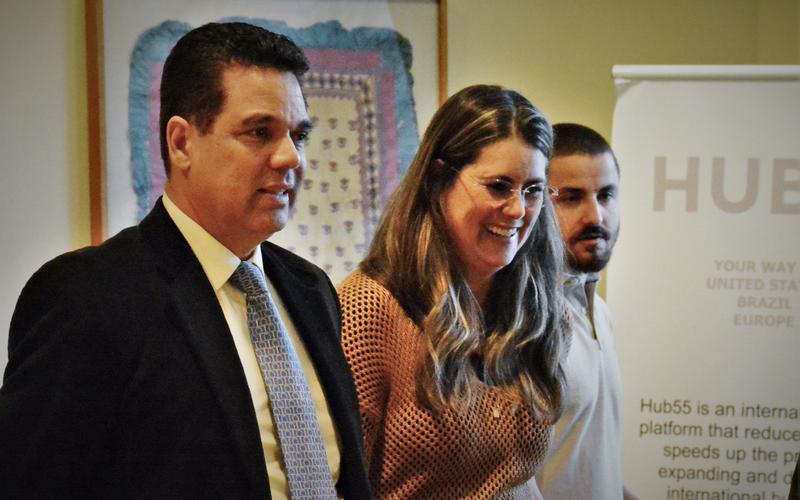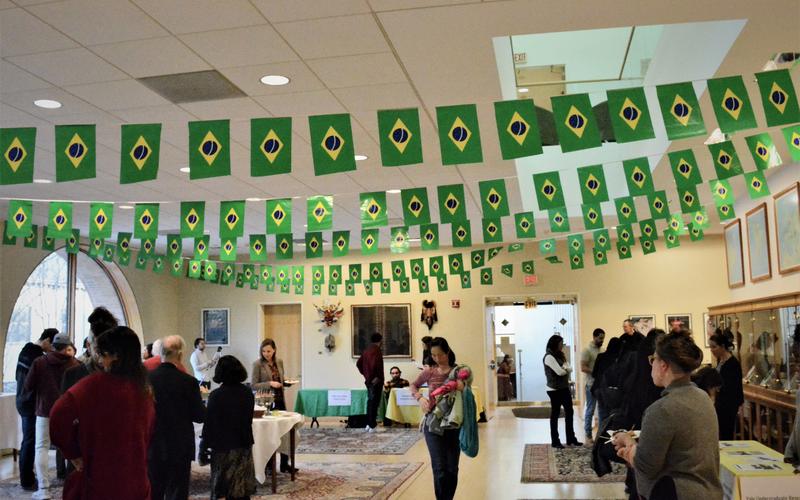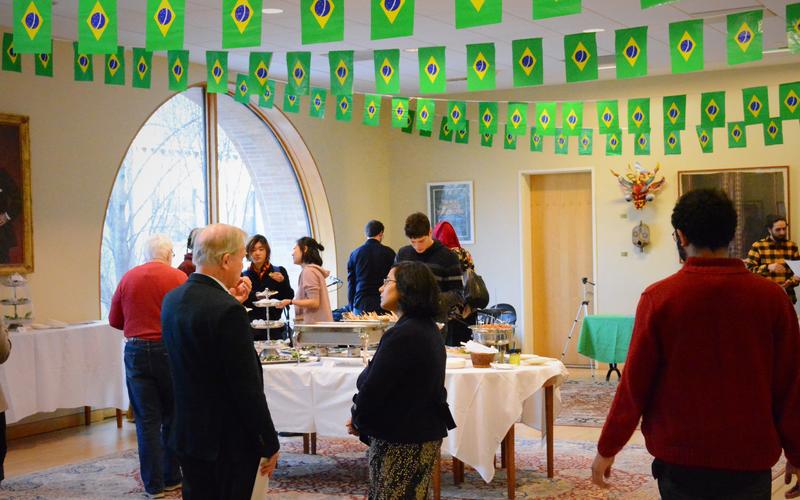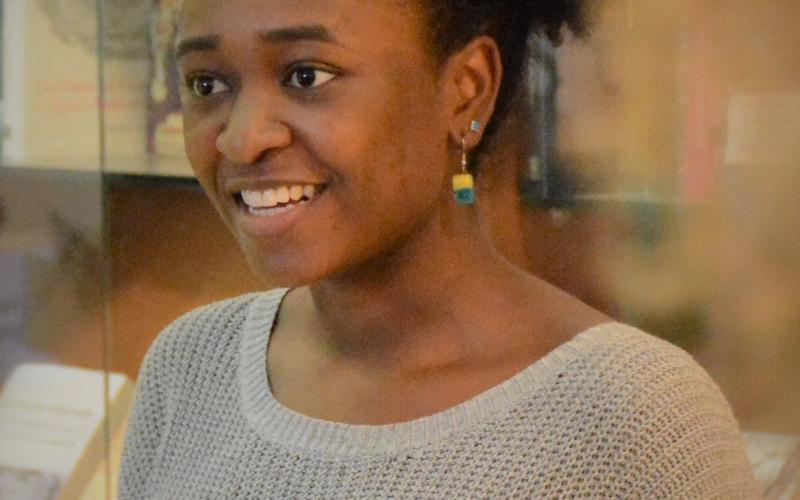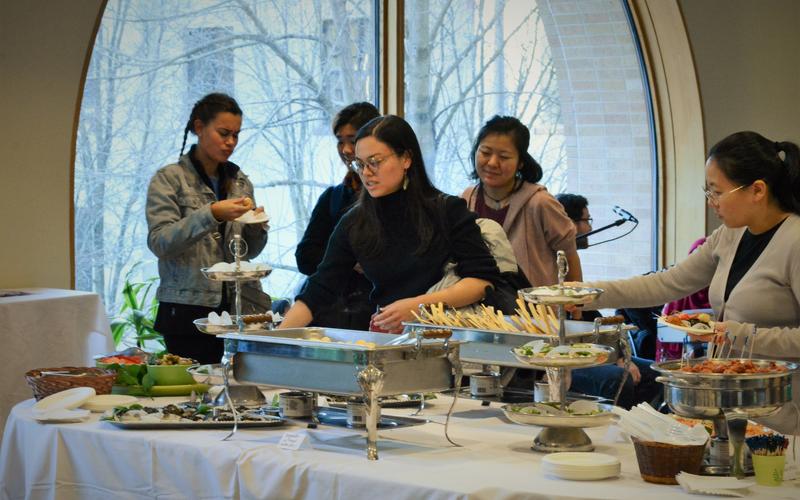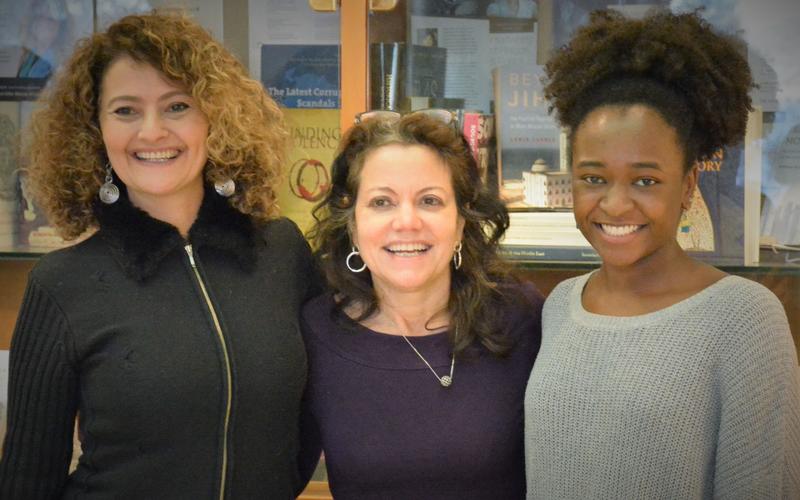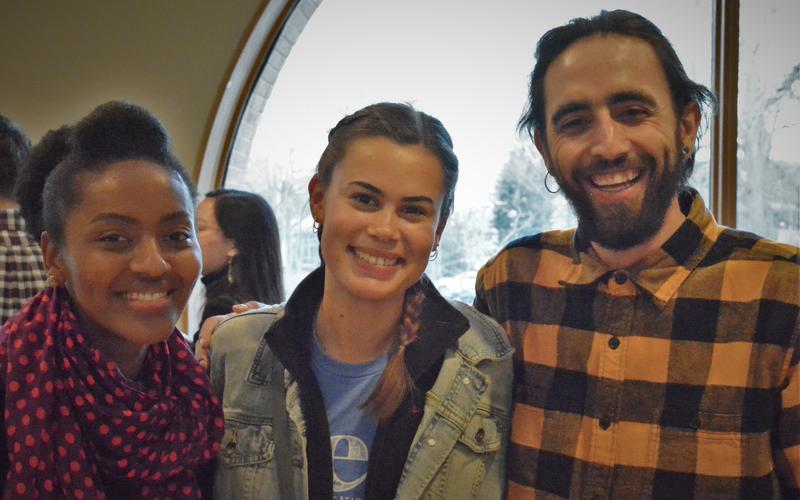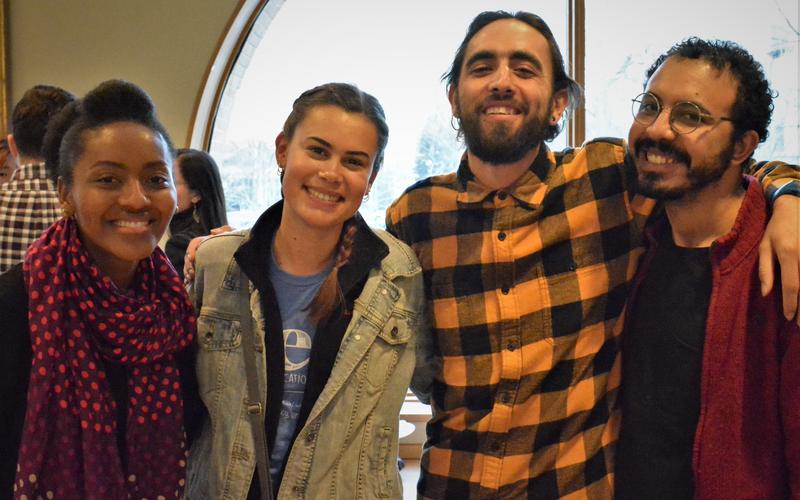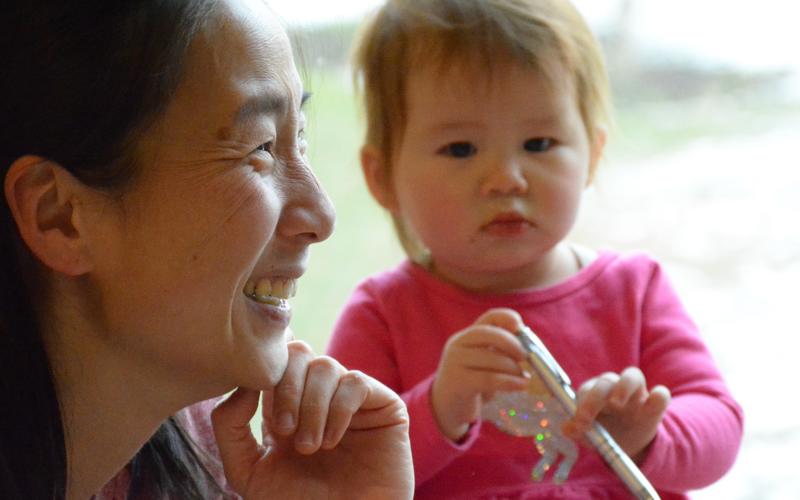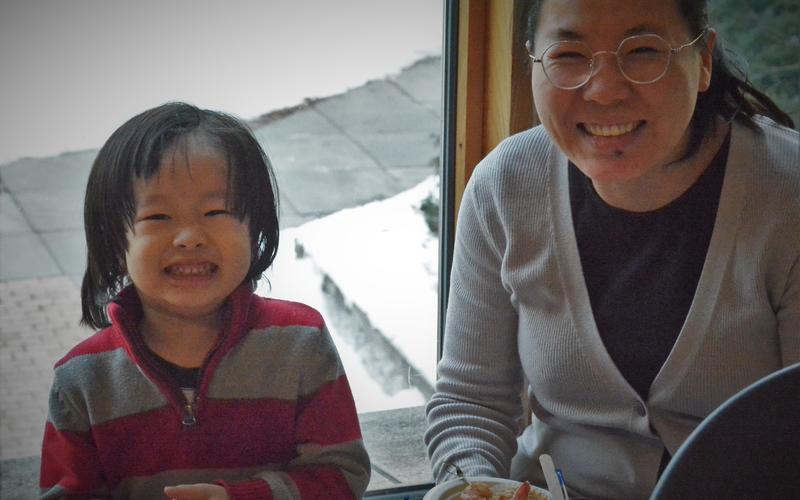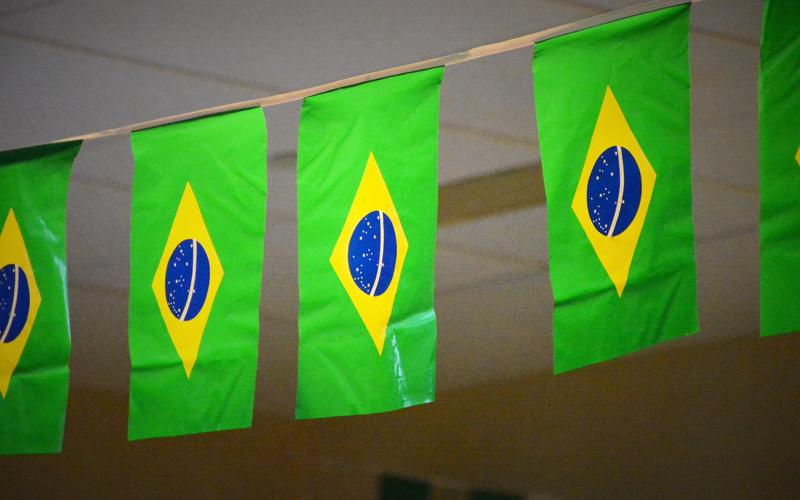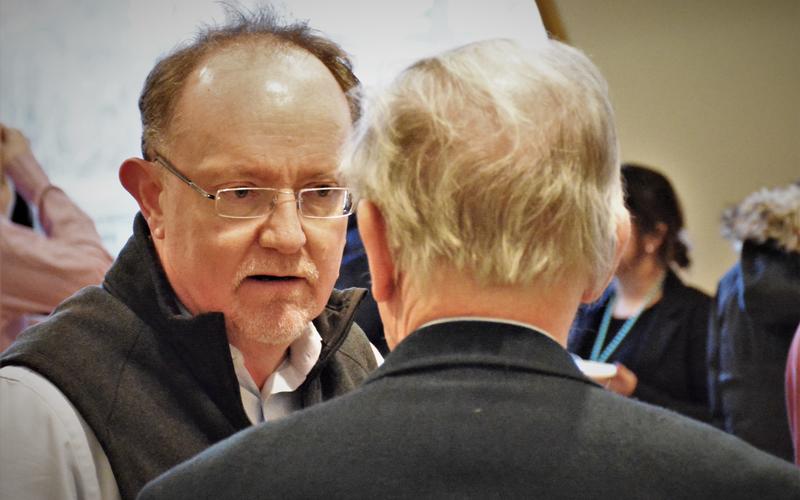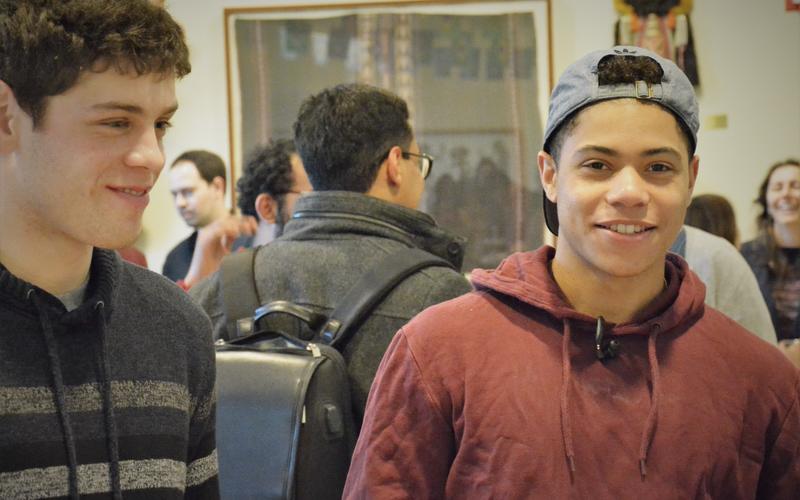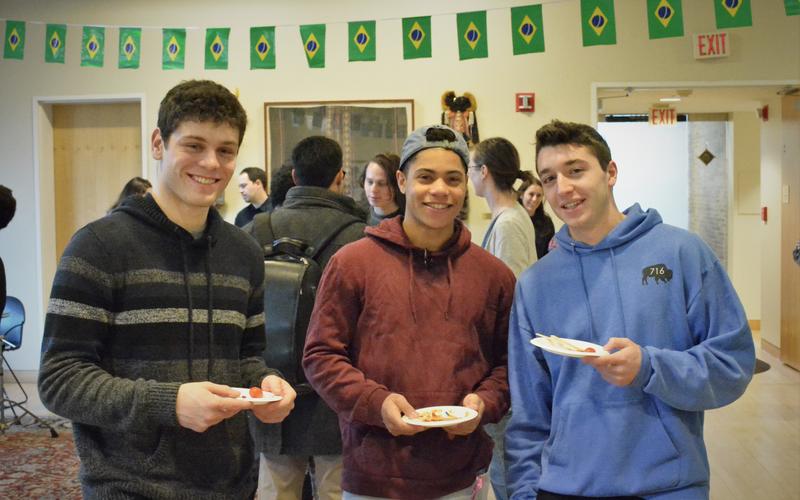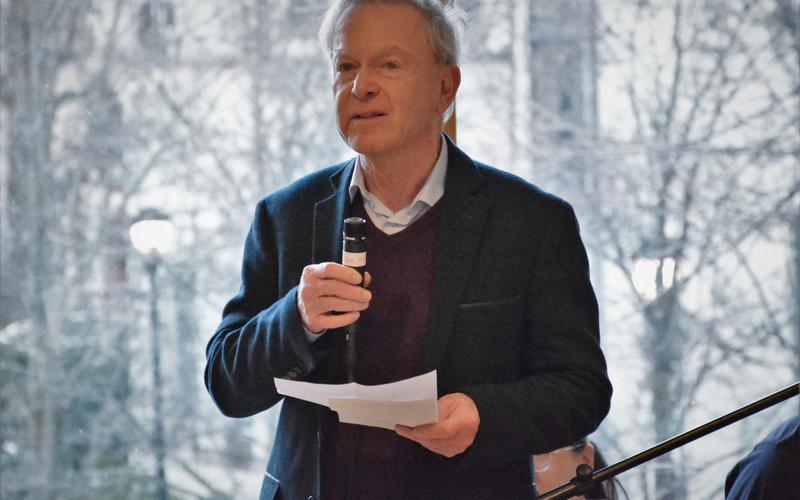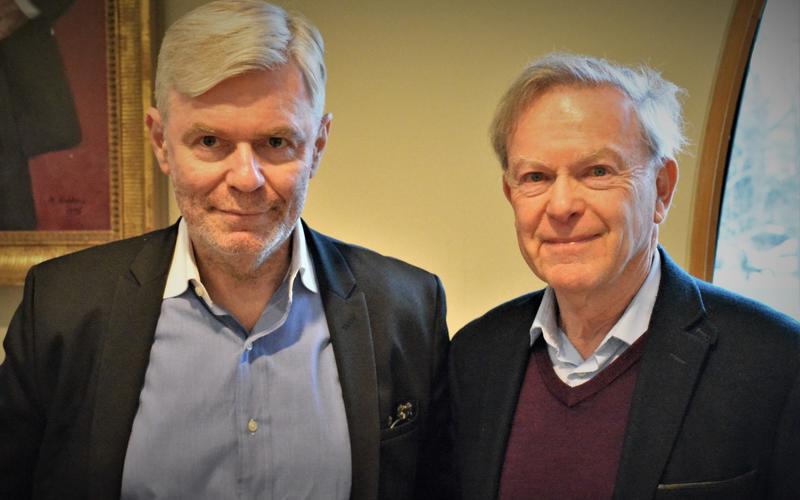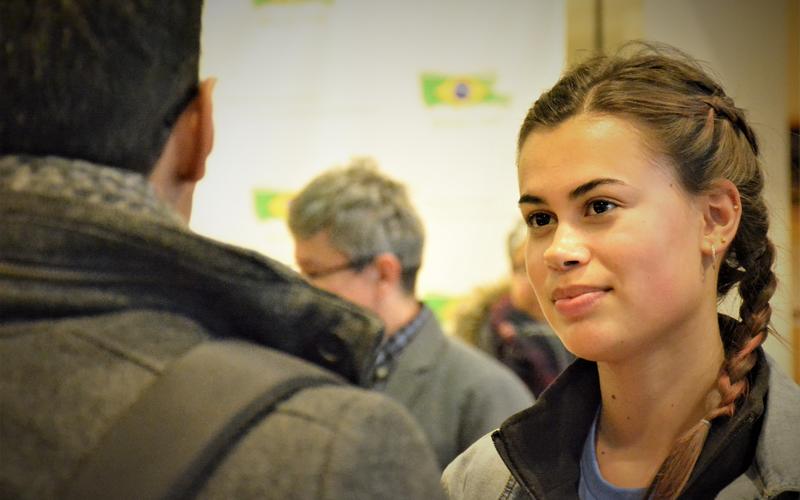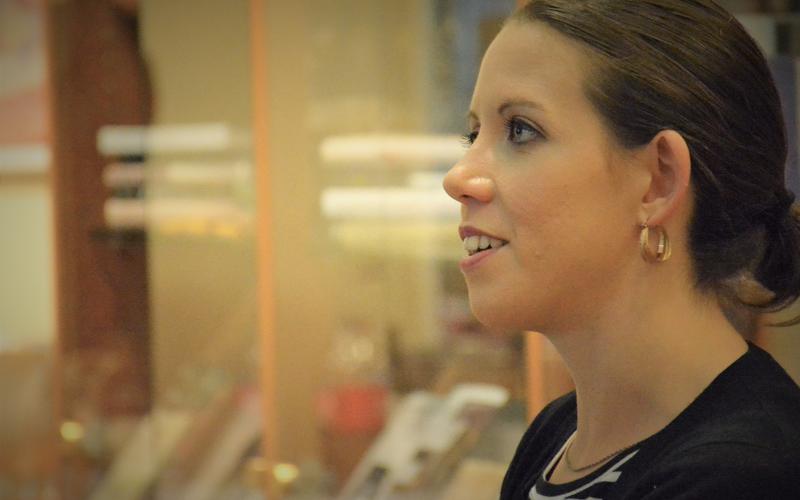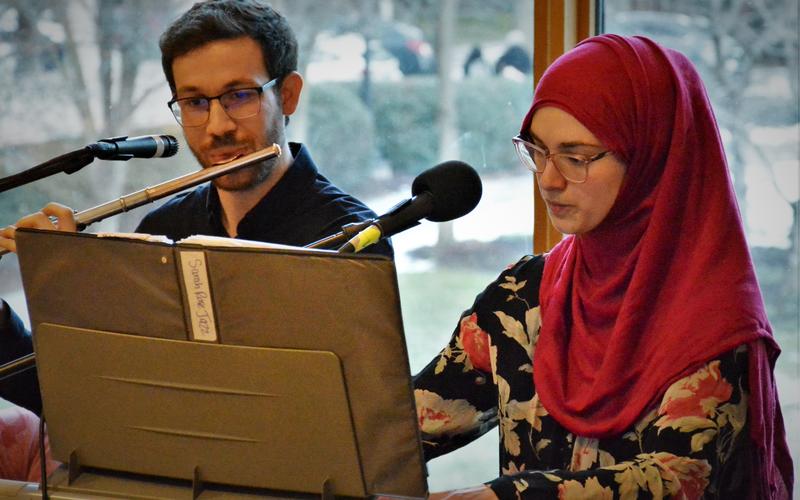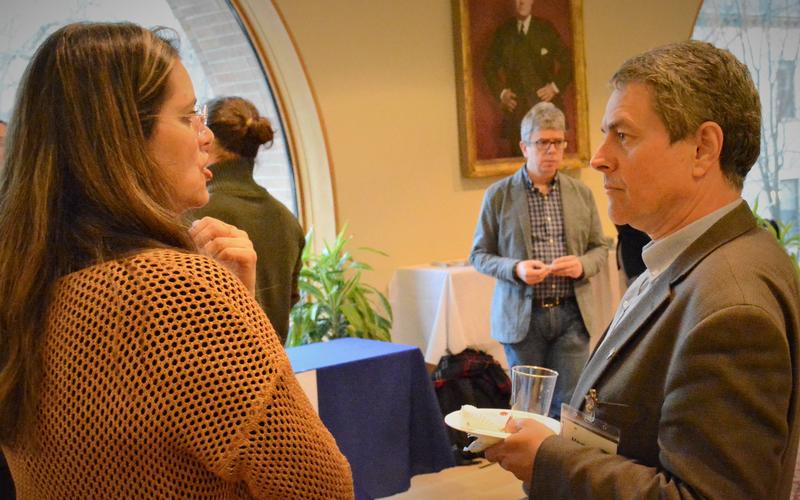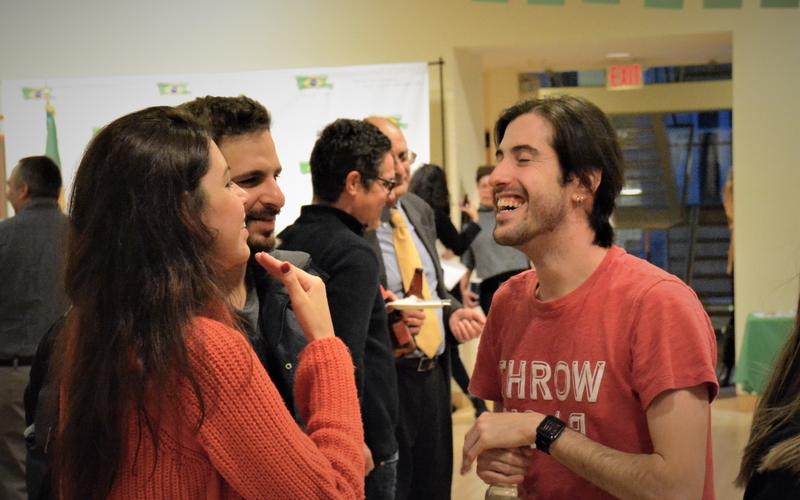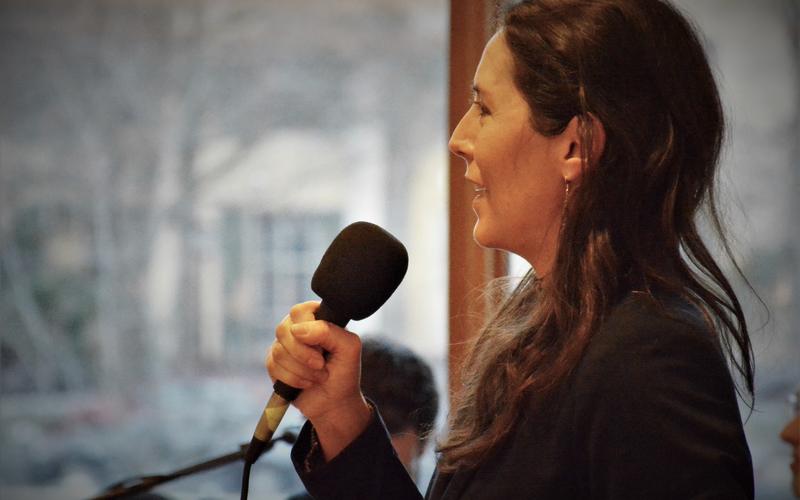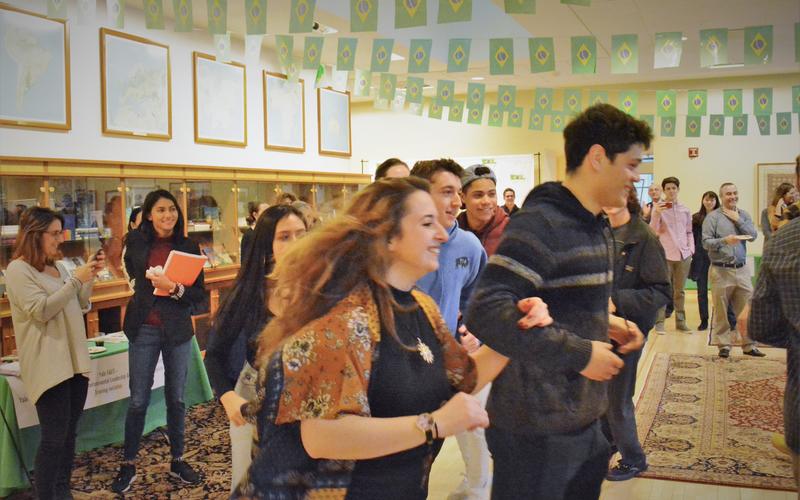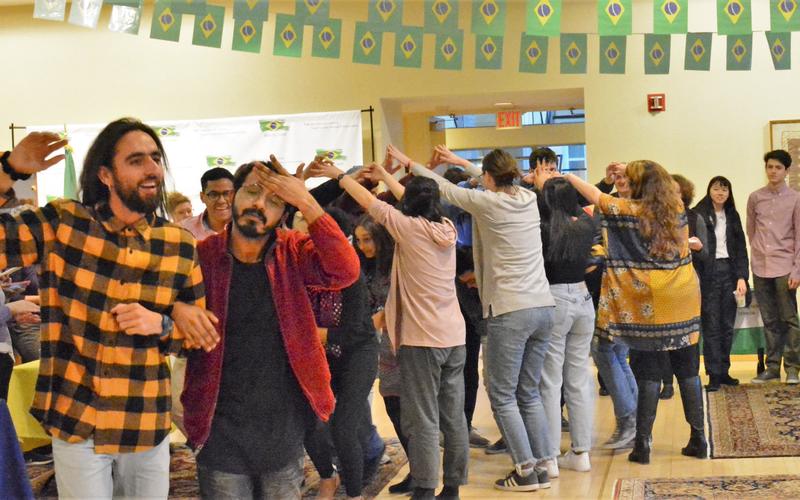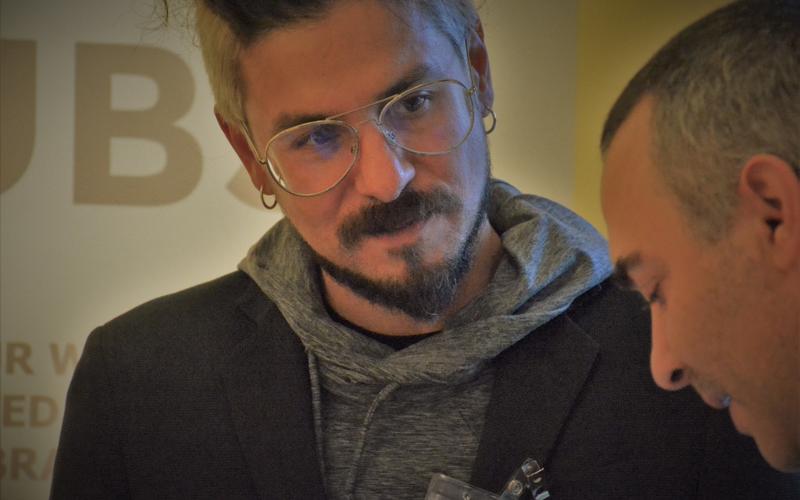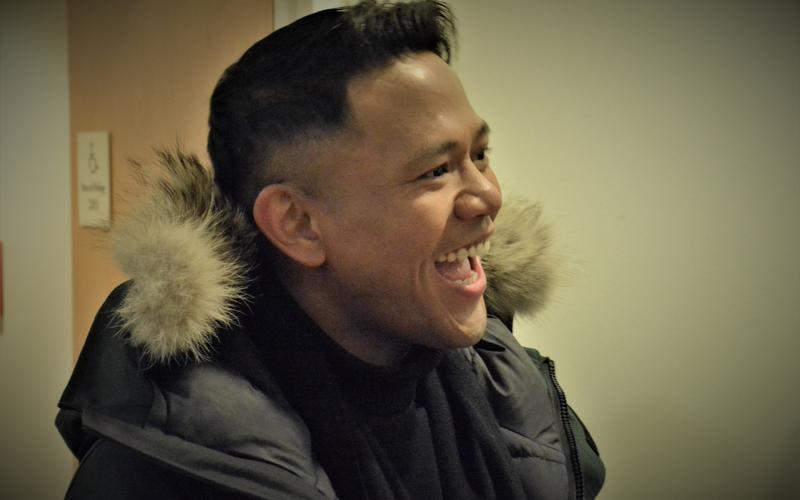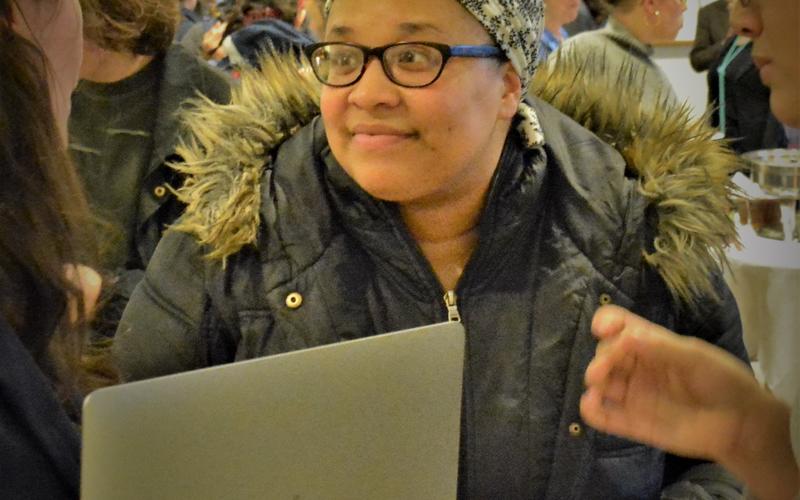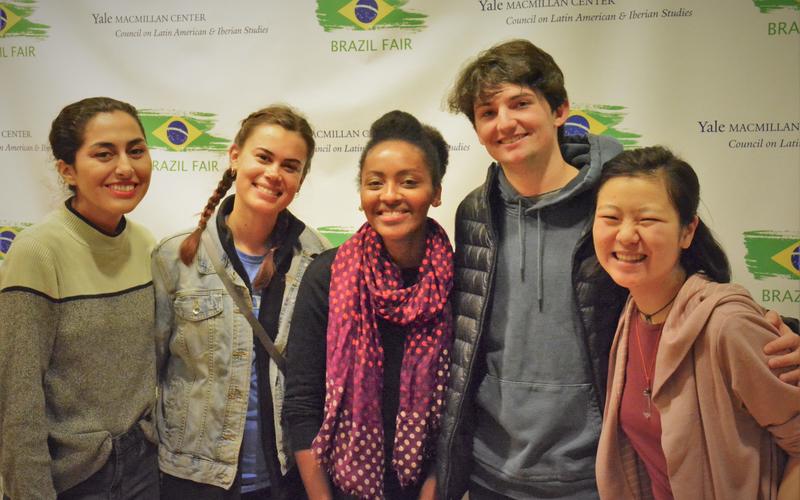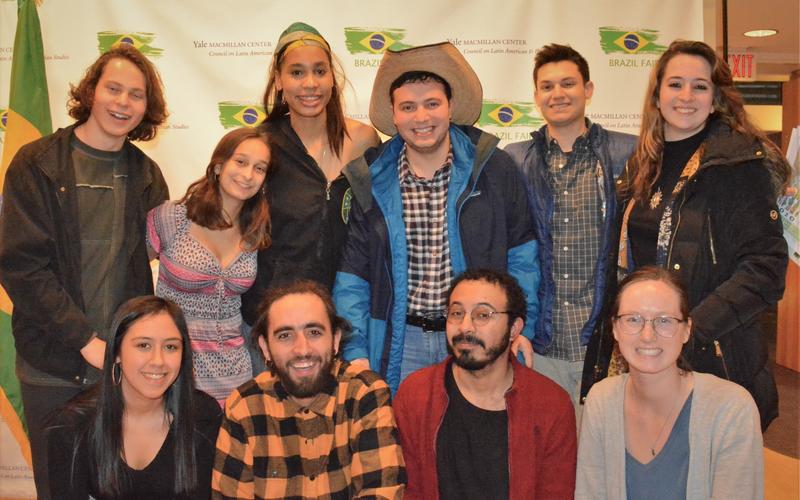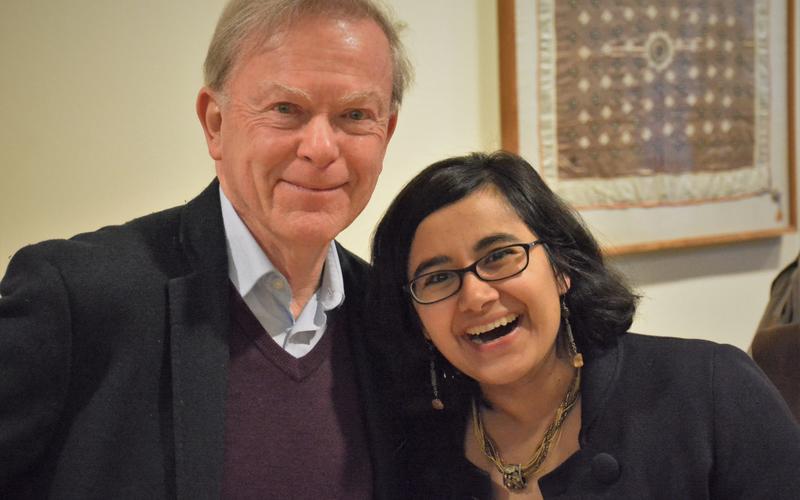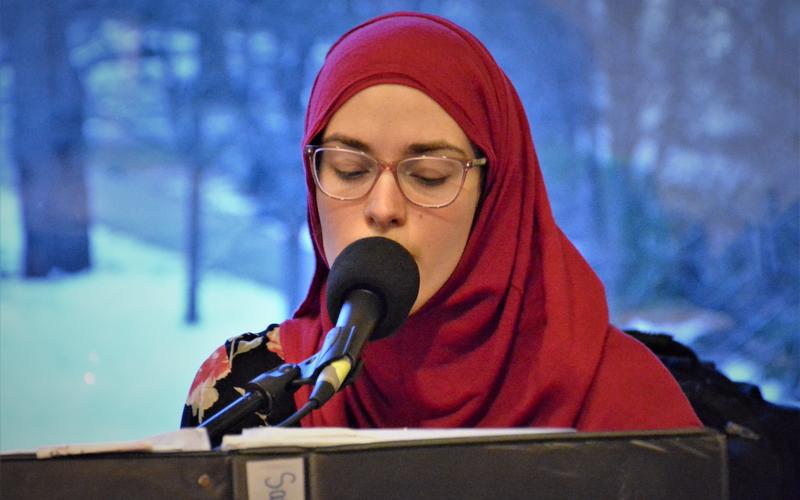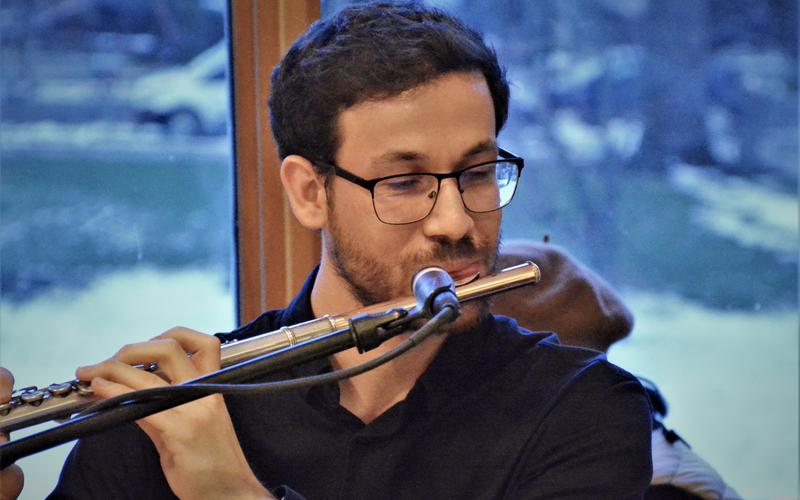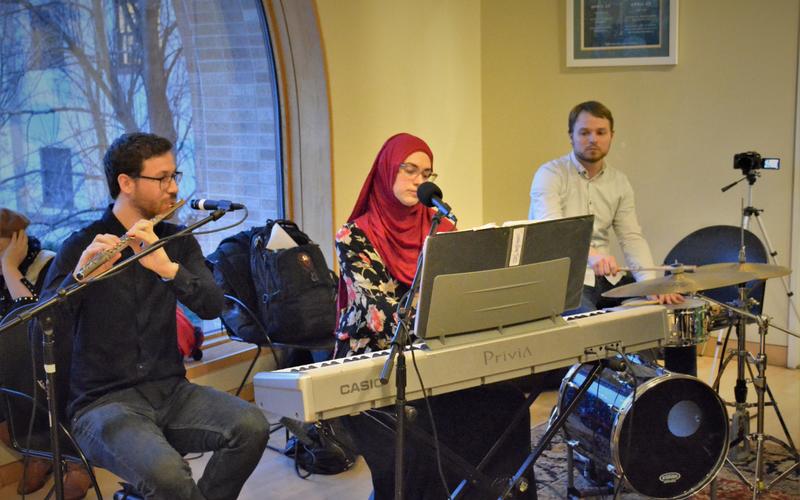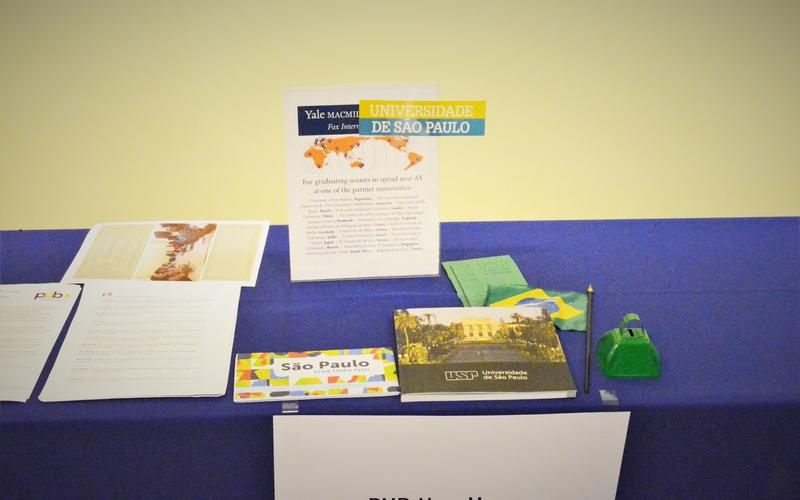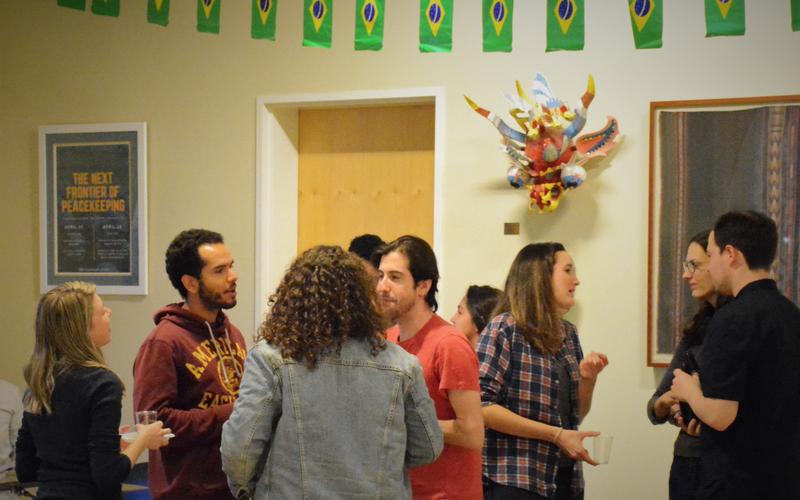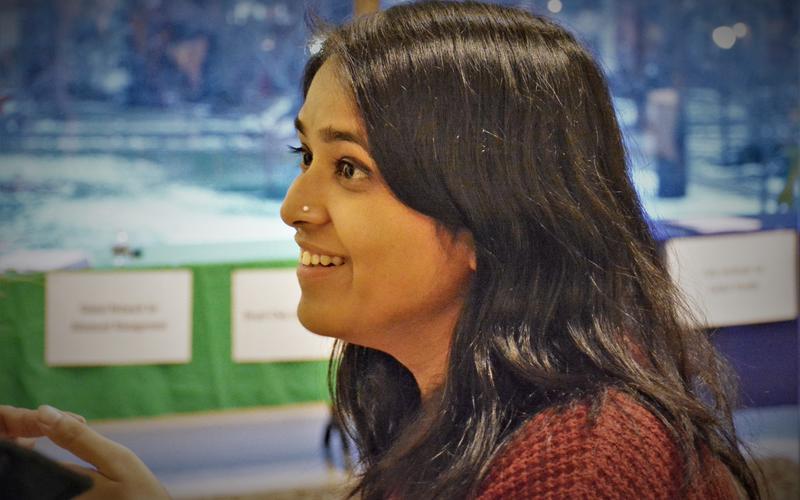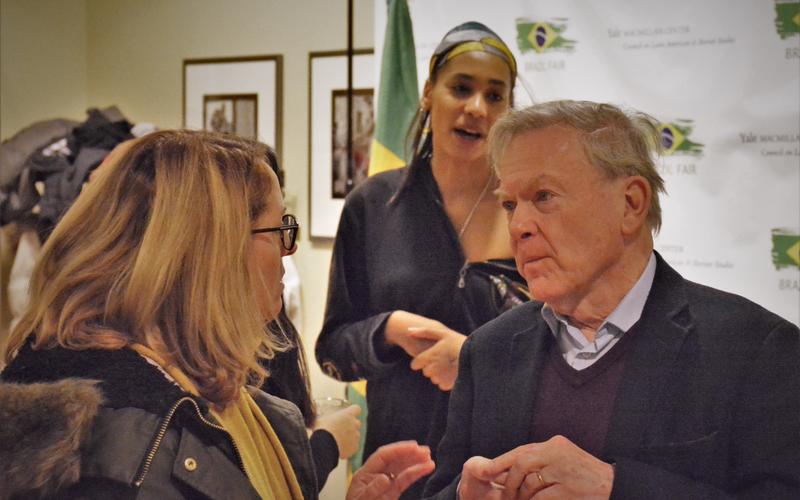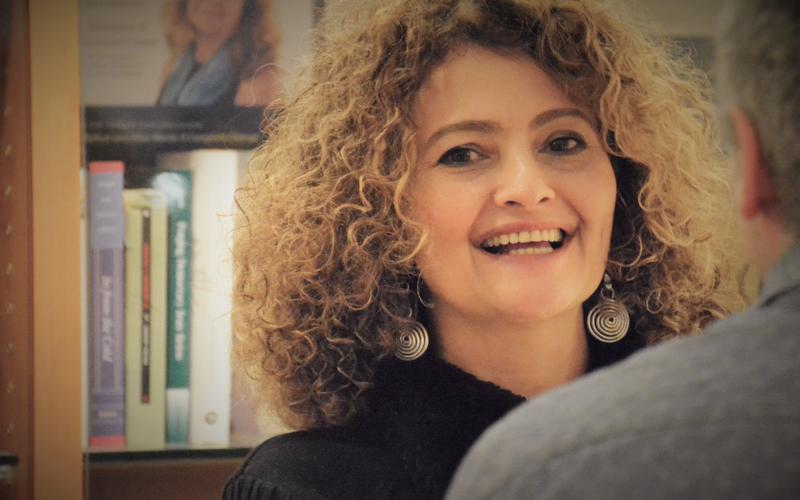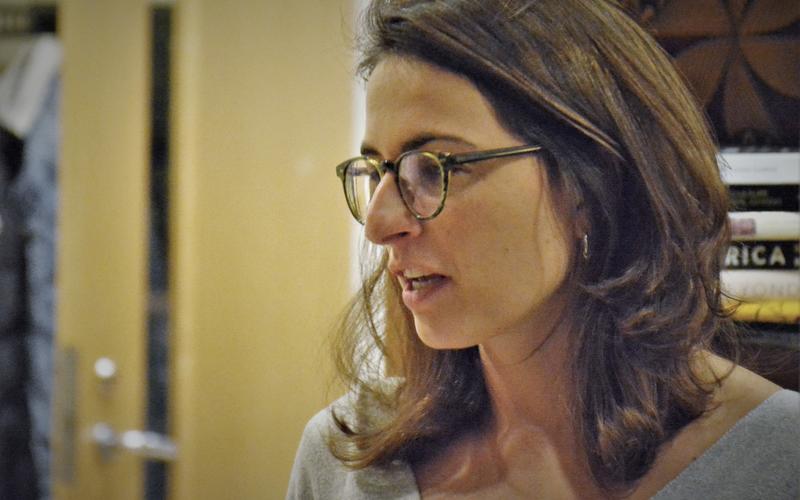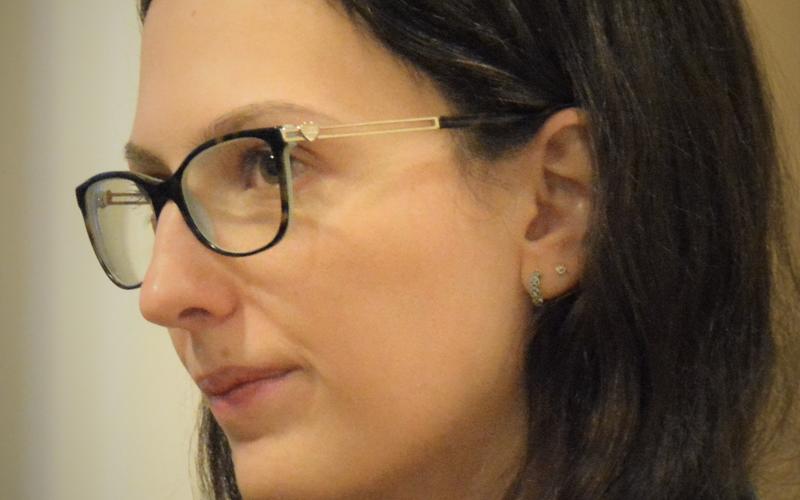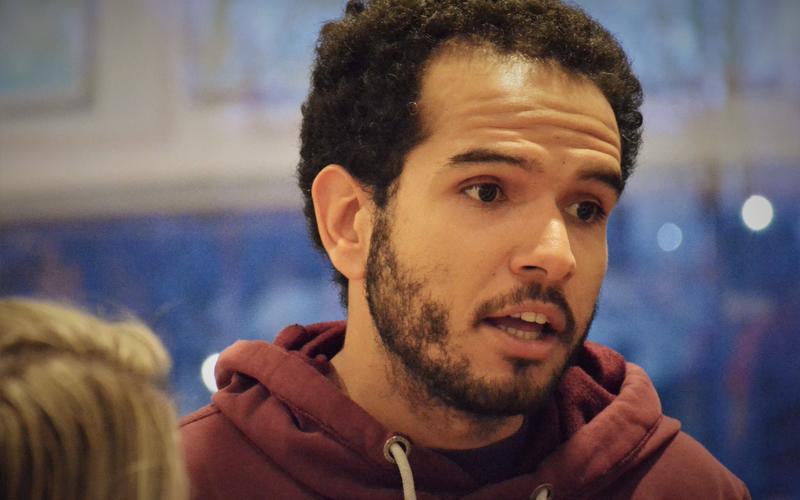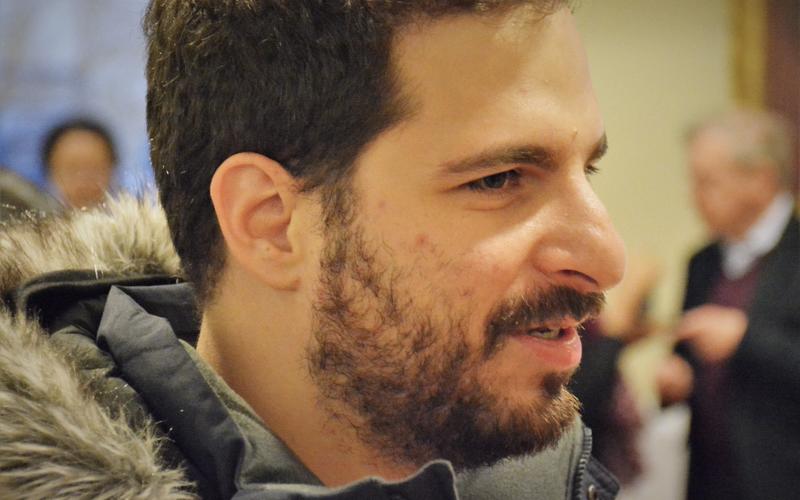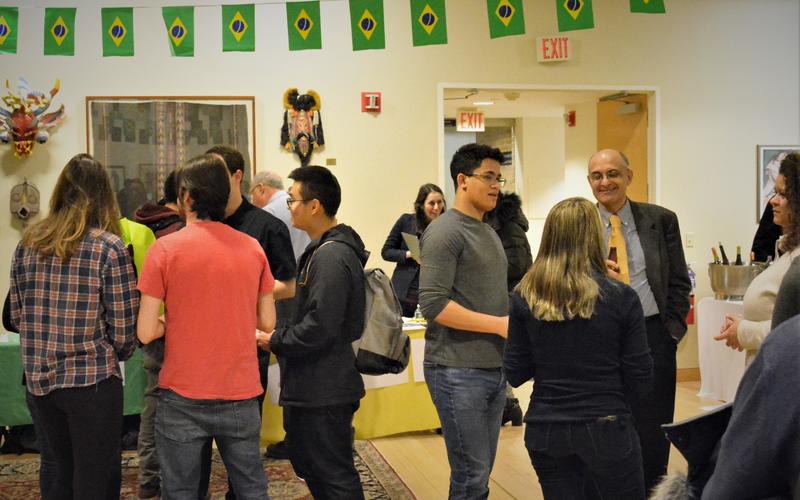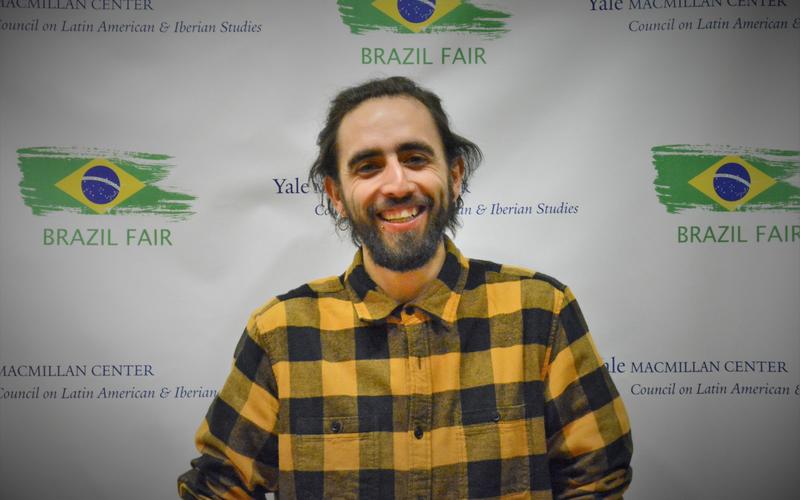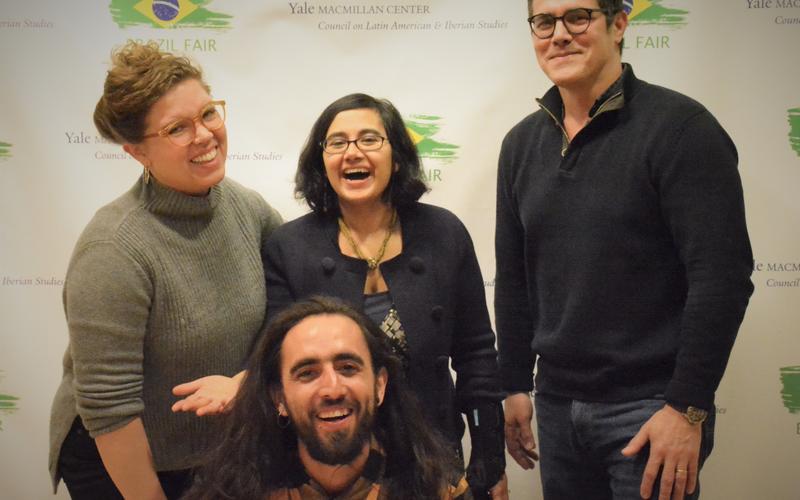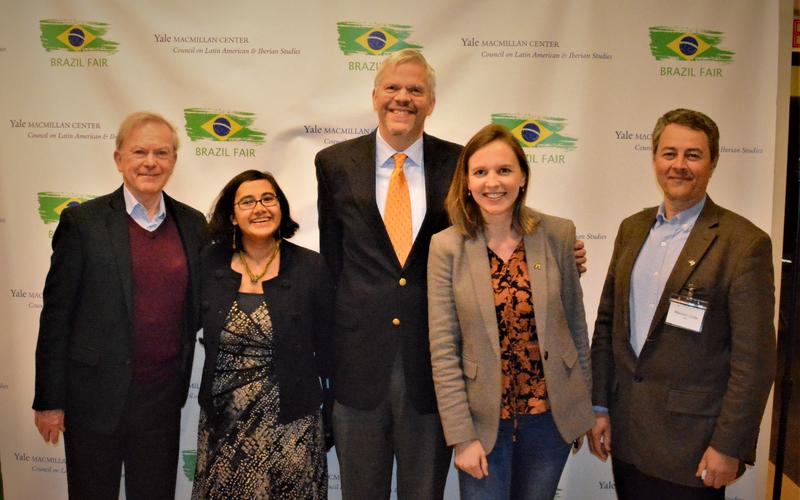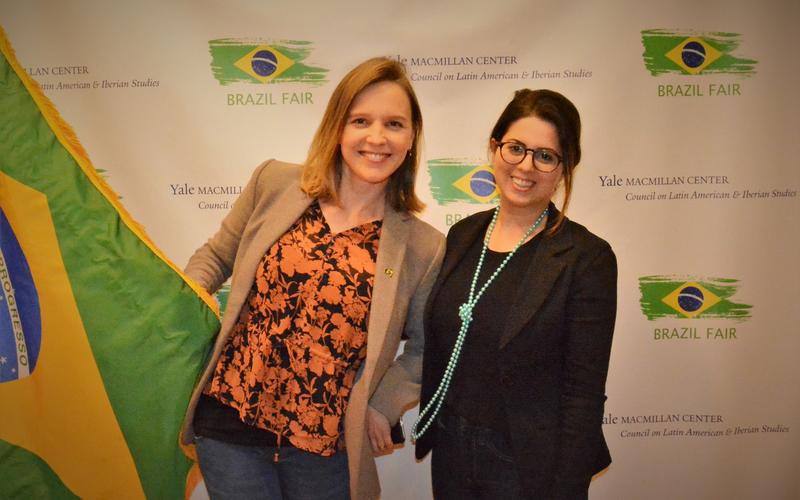The Council for Latin American and Iberian Studies hosted our second Brazil Activities Fair on Friday, January 24, 2020 from 4 - 6pm. More than 100 people came to Luce Hall to learn more about the diverse array of research, activities, and opportunities related to Brazil available through Yale University’s undergraduate, graduate, and professional programs.
Representatives from departments and institutions across and beyond the university showcased their programs and offering, while all enjoyed live Brazilian music from a trio featuring Joseph Murfin (percussion), Sarah Rose (piano/voice), and led by Lucas Guedes Oliveira (flute). Students from Yale’s Portuguese class entertained the crowd with a demonstration of the quadrille dance, the traditional dance and music from the São João Festival, led by Professor Giseli Tordin and Fulbright Foreign Language Teaching Assistants Andrade Teleginski and Ivo Cruz.
The Fair also connected with the broader Brazilian community in the New Haven area. We were honored to have Counselor Carlos Vinícius Vizioli from the Brazilian consulate in Hartford join us. Hub55, an internationalization platform that supports collaborations with Brazil,also brought a group of Brazilian entrepreneurs who were in the New Haven area for a business international exchange.
The booths and representatives showcased the wide-range of Brazil related work at Yale, from language and study abroad opportunities to environmental initiatives to research on racial justice and corruption. Graduate students had the opportunity to share research experiences and build networks, while visiting scholars from Brazil learned more about opportunities on campus beyond their hosting departments.
The Brazil Activities Fair is a part of the Council for Latin American and Iberian Studies “Focus on Brazil” program, and we look forward for more opportunities to connect, share, and expand our Brazil related work across campus and with the wider community.
Organizations
Brazil Club at Yale University
The Brazil Club is an undergraduate organization at Yale University with the purpose of promoting Brazilian culture around campus and supporting Brazilian undergraduate students at Yale.
CAPES-Yale Graduate Scholars Program
The CAPES-Yale Graduate Scholars Program trains the most promising Brazilian students and prepares them to become international leaders in academia and industry. Students are jointly funded by CAPES and Yale and are eligible to join any Biological and Biomedical Sciences (BBS) Track. They participate in all regular BBS academic activities and additionally participate in specialized professional development programs exclusively for them. Yale has helped to train Brazilian leaders for almost 200 years and looks forward to training a new generation of scientists and scholars.
Global Network for Advanced Management
Our mission is to drive innovation and create value by connecting leading global business schools, their resources, and their stakeholders.
Launched in 2012, the Global Network for Advanced Management includes 32 leading business schools from diverse regions, countries, cultures, and economies in different phases of development. A common motivation of member schools to connect is to position their students, faculty, staff, alumni and other constituencies so that they can deepen their understanding of differences and commonalities in their economies and increase their effectiveness. Member schools recognize that leaders in all sectors will be asked to contribute to the solutions of major problems that are typically complex and global.
Representing a shift beyond traditional partnership models of business school collaboration, the Global Network enables the development of innovative initiatives that leverage the schools’ comparative advantages. Leveraging network efficiencies, utilizing new technologies, building strong institutional and personal relationships, and operating with a minimum of bureaucracy, the Global Network is having a transformational effect on students, member schools, management education, and beyond.
FGV Escola de Administração de Empresas de São Paulo is the Global Network member school in Brazil.
The PUB - New Haven
The PUB - New Haven is meant to organize monthly meetings to (1) share any work related to Brazil or (2) any work from Brazilians at Yale. The PUB - New Haven also intend to (2) make the Brazilian community stronger and participative, as well as, (3) to facilitate the Brazil-EUA transition of Brazilians at Yale.
Yale Fox International Fellowship
The Fox International Fellowship is a graduate student exchange program between Yale and 19 world-renowned partner universities. Fox International Fellows are selected for their potential to become leaders in fields that are policy significant, historically informed, and socially meaningful. Such work is increasingly conditioned by the interdisciplinary and transnational character of knowledge and practice in the twenty-first century. Fellows’ research projects and academic interests reflect the areas toward which many of the world’s major decision-makers have gravitated, as well as those that have the potential to open new channels of debate.
University of Sao Paulo, Brazil
University of Sao Paulo (U.S.P.) is internationally acclaimed as one of the best universities in Latin America. Created during the 1930s in Brazil, U.S.P. is a public university owned by the state of Sao Paulo that has more than 90,000 students. According to the most prestigious Brazilian graduate ranking, some of the best graduate programs of U.S.P. are Political Science, Economics, Environmental Sciences, Sociology and Philosophy. Nonetheless, any of the subjects of the Fox Fellowship can be studied in U.S.P.
Yale Law School Latin American Linkage Program
Program in Brazil
The Linkage Program in Brazil is a collaborative effort with the Universidade de São Paulo and FGV Direito in São Paulo and the Universidade do Estado do Rio de Janeiro and FGV Direito in Rio de Janeiro. The main goal of the program is to promote better understanding of the relationship between law and democratic values in the United States and Latin America. Participants are hosted by students of our partner schools in São Paulo and Rio de Janeiro and host the students selected from those schools when they visit Yale at the beginning of our spring semester.
Participating students have worked on a wide variety of projects, including setting up law journals, developing new academic programs and seminars, and conducting research for NGOs involved with human rights issues. In the past students have also combined Linkages with other activities, including conducting empirical research on elections and corruption and interning at the Brazilian Supreme Court.
Students enrolled in the Law School are invited to apply. The program requires intermediate proficiency in Portuguese, active involvement in the Yale leg of the exchange, and some background reading prior to the trip to become familiar with Brazil’s political and legal history and structures. The program begins when classes at our partner schools resume after their winter recess, which usually occurs at the end of July or beginning of August. The travel and living expenses of participants are covered by the Yale Law School.
Program in the United States
Every year, students from the Universidad de Palermo in Buenos Aires, the Universidad Diego Portales and Universidad de Chile in Santiago, the Universidade de São Paulo, Fundação Getulio Vargas in both Rio de Janeiro and São Paulo and the Universidade do Estado de Rio de Janeiro in Brazil come to New Haven. Besides observing classes, they meet separately with professors, lawyers, judges, and student leaders who share similar professional and personal interests. At the end of the program, the group travels to New York to observe hearings at the Second District Federal Court of Appeals, have lunch with lawyers in Latin American practice at one of the major firms, and visit the offices of one of the major international human rights organizations
Yale School of the Environment - Environmental Leadership & Training Initiative (ELTI)
ELTI is a capacity developing program of Yale F&ES that trains and supports people from all sectors and backgrounds to restore and conserve tropical forest landscapes using strategies that support biodiversity and livelihoods. ELTI has trained over 6,000 people, implemented more than 130 training events and supported over 270 post-training activities throughout the tropics.
ELTI training model emphasizes the development of skills sets and networks that participants can apply to develop and improve restoration and conservation initiatives. We train landholders, practitioners and decision makers and offer our alumni post-training support to help them take action and implement their own training events and projects.
Our field-based and online training programs reach a broad audience:
• Neotropics Field Program: Brazil, Colombia and Panama
• Tropical Asia Field Program: the Philippines and Indonesia
• Online Training Program: global
ELTI’s field programs work with a network of local partners to implement and operate focal training sites. These sites are dynamic learning hubs where students, researchers, practitioners, trainers, farmers and communities conduct projects and exchange research and applied experiences. In Brazil, the focal training site is under development in collaboration with the Institute for Ecological Research (Ipê).
Each focal training site includes:
• Curricula on ELTI’s core themes for different audiences
• Corresponding trail systems that highlight different components of the curricula
• Field exercises for participants to practice different lessons in the course
• Nearby case studies with local landholders
• A range of course materials, including field guides and course manuals
Yale School of the Environment - The Forests Dialogue
The Forests Dialogue (TFD) was created in 1998 to provide international leaders in the forest sector with an ongoing, multi-stakeholder dialogue (MSD) platform and process focused on developing mutual trust, a shared understanding, and collaborative solutions to challenges in achieving sustainable forest management and forest conservation around the world. From its origins in the forestry sector, TFD’s successful engagement model has expanded to encompass other land-intensive sectors and actors – helping the organization and its partners to realize their central goal of reducing conflict among stakeholders over the use and protection of vital forest, land, and natural resources.
Over the past seventeen years, TFD has brought together more than 2,500 leaders from across sectors and geographies to work through critical issues related to forests and the myriad stakeholders who rely upon them. While TFD’s footprint is truly global – with past and ongoing activities in all hemispheres – Brazil and Latin America feature prominently in the organization’s focus. Helping to ensure the success of TFD’s engagement model, TFD is governed by a Steering Committee (SC) composed of a diverse group of leaders representing key stakeholder perspectives from around the world. Several past and current SC members are from Brazil and Latin America, as are a number of TFD’s graduate student program associates. Reflecting its strong commitment to the region, TFD is actively expanding its in-country engagement through novel, long-term dialogue platforms known as “Land Use Dialogues” (LUDs).
Center for International and Professional Experiences – Study Abroad Opportunities
Study Abroad Deadlines
Elementary Portuguese for Romance Language Speakers I & II + Culture
CASA Brazil (formerly Brown in Brazil)
Academic Year or Fall in Rio de Janeiro, Brazil
The Consortium for Advanced Studies Abroad (CASA) program builds upon the Brown University program at the Pontifícia Universidade Católica do Rio de Janeiro (PUC-Rio), providing students with a unique opportunity for complete immersion in the Brazilian culture. Students benefit from its rigorous curriculum and direct engagement with Brazilian students, and develop their individualized course of study in consultation with the CASA program director and local coordinator.
Yale Summer Session in Paraty & Rio de Janeiro: Elementary Portuguese for Romance Language Speakers I & II + Culture
Yale Summer Session Program Abroad
An intensive elementary program in Portuguese language emphasizing development of all language skills, with an introduction to Brazilian cultural history which covers essential themes and figures from 1500 to the present; conducted in English with sessions in Portuguese in Brazil. This program completes the Portuguese language requirement for Latin American Studies majors.
University of Florida in Rio de Janeiro
Non-Yale Summer Abroad
The University of Florida Language and Culture Program in Rio de Janeiro is a 6-week, FLAS-certified program offering 140 contact hours of classroom instruction in Portuguese. Classes and assignments are based on the 5 “C’s” of Language Learning: Communication, Culture, Communities, Comparisons, and Connections. All classroom activities and assignments involve intensive language instruction in Portuguese. The program offers three levels: intermediate, advanced intermediate and advanced, plus a cultural component for all levels. Classes are held at the IBEU (Instituto Brasil-Estados Unidos); located in the heart of the Copacabana section of Rio de Janeiro.
SIT Argentina: Transnationalism and Comparative Development in South America
Non-Yale Semester program with 1 week in Brazil
Examine the social and economic development strategies of South America’s Southern Cone countries — Argentina, Brazil, Paraguay, and Uruguay. In this comparative study abroad program, students rapidly improve their Spanish while exploring the current economic and social realities of the countries comprising the Southern Common Market (MERCOSUR). Students visit three additional MERCOSUR member states during group excursions.
SIT/IHP Cities in the 21st Century: People, Planning, and Politics - Spring
Non-Yale Spring Semester program, with 4 weeks in Sáo Paolo
Explore how geography, politics, economics, and culture shape social relations and the built environment — and with what consequences — in cities across the globe. This program combines an innovative urban studies curriculum with fieldwork involving key actors and stakeholders — public agencies, planners, elected officials, NGOs, and grassroots organizations. You will spend time in four cities across the globe to better understand the interconnected social, physical, economic, environmental, and political systems affecting urban environments. In addition, you will complete an independent comparative research project on a topic of your choosing.
SIT/IHP Health & Community: Globalization, Culture, and Care - Fall and Spring
Non-Yale Semester Program, Track 1 includes 5 weeks in Brazil
Learn how communities around the world understand and strive for health and well-being. This program will strengthen your ability to understand, interpret, and compare the socio-cultural, ecological, economic, political, and biological factors that affect human health. From North America to South Asia and Africa to South America, in city neighborhoods and rural villages, you will learn to listen to and understand multiple voices: people in local communities, governing bodies and nongovernmental agencies, caregivers, and those receiving care.


